Analysis of HR Professional Skills, Knowledge, and Development Plan
VerifiedAdded on 2020/06/05
|17
|5072
|51
Report
AI Summary
This report examines the essential skills, knowledge, and behavioral approaches required of HR professionals, particularly in the context of Whirlpool. It analyzes the crucial skills such as communication, judgment, negotiation, and ethical practices necessary for effective performance. The report includes a personal skills audit, SWOT analysis, and a development plan addressing areas for improvement like psychological analysis, multitasking, and conflict resolution. It also differentiates between individual and organizational training and development, highlighting their distinct impacts on employee performance and organizational objectives. The report emphasizes the importance of these skills for implementing organizational changes and achieving strategic goals. The report provides a development plan for the HR consultant to enhance their skills, recognizing the importance of continuous learning and adaptation in the fast-paced professional environment.
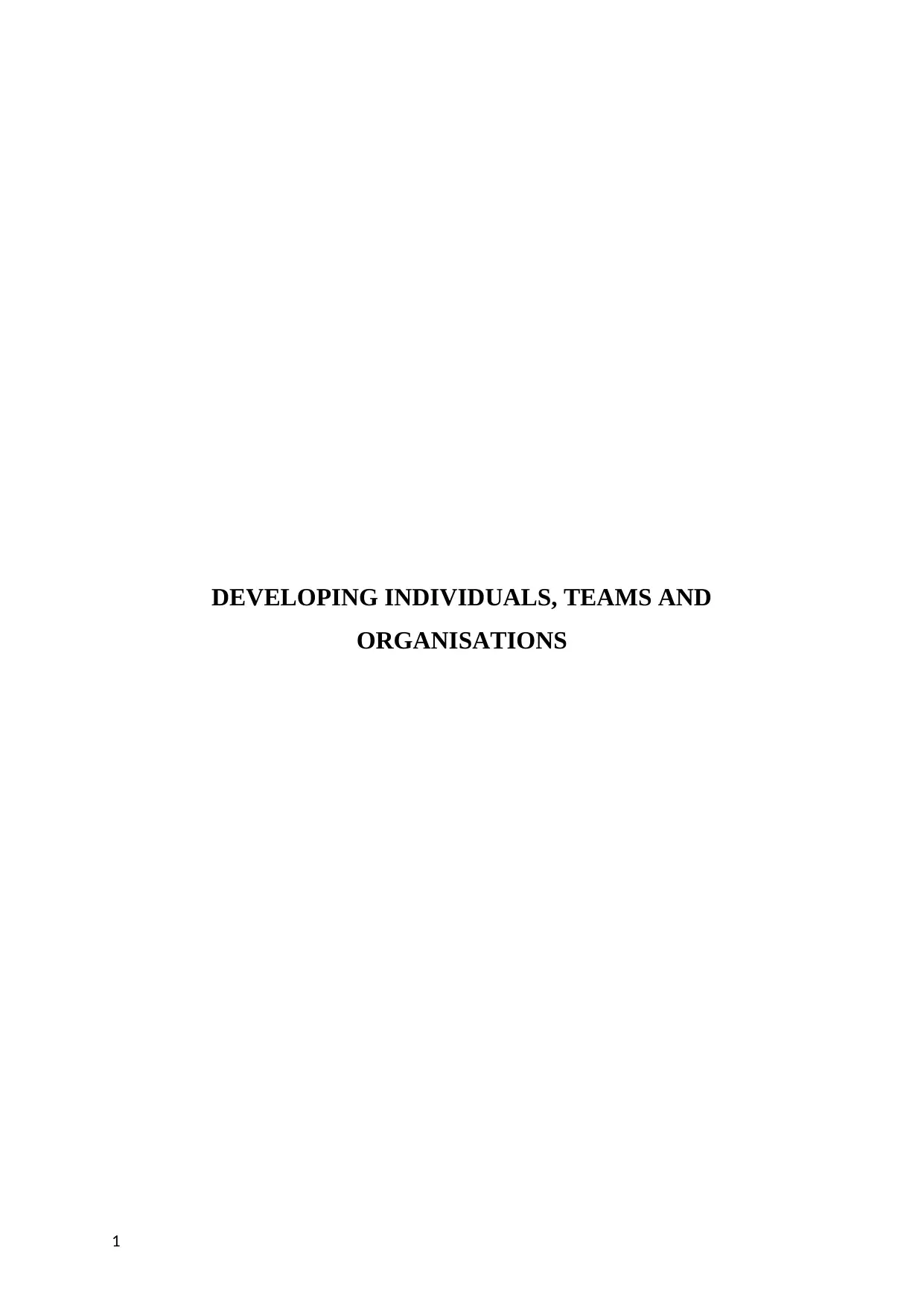
DEVELOPING INDIVIDUALS, TEAMS AND
ORGANISATIONS
1
ORGANISATIONS
1
Paraphrase This Document
Need a fresh take? Get an instant paraphrase of this document with our AI Paraphraser
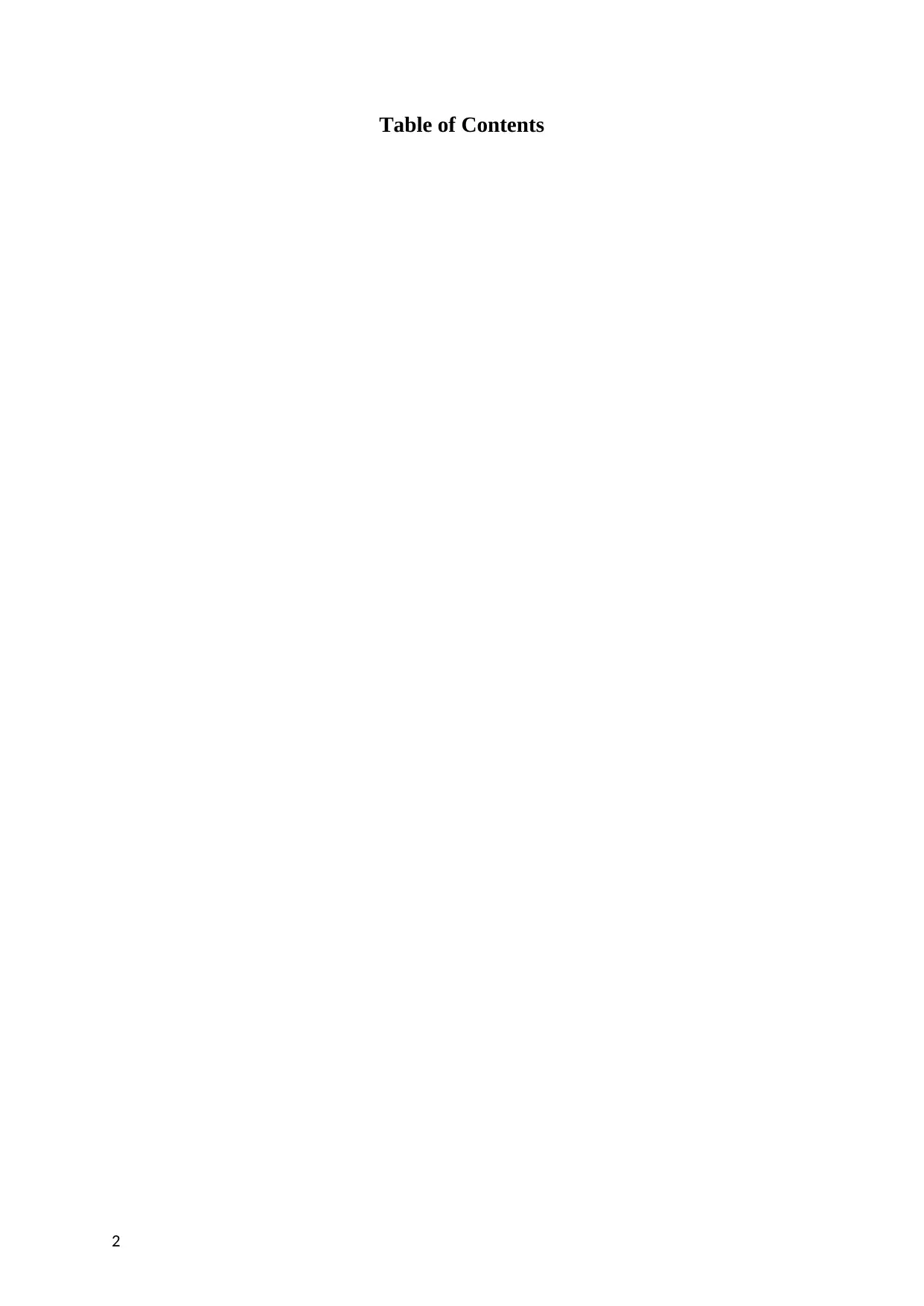
Table of Contents
2
2
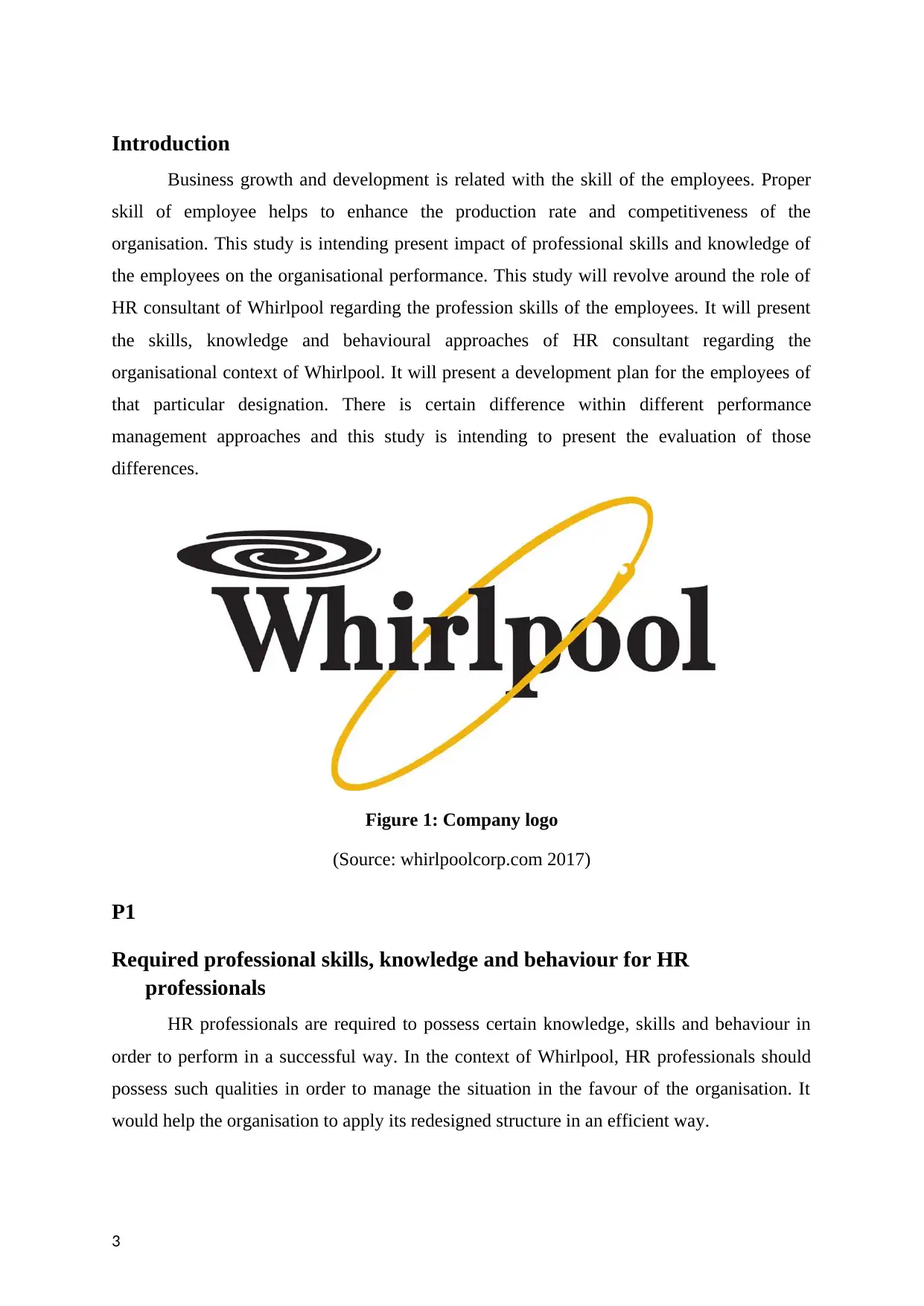
Introduction
Business growth and development is related with the skill of the employees. Proper
skill of employee helps to enhance the production rate and competitiveness of the
organisation. This study is intending present impact of professional skills and knowledge of
the employees on the organisational performance. This study will revolve around the role of
HR consultant of Whirlpool regarding the profession skills of the employees. It will present
the skills, knowledge and behavioural approaches of HR consultant regarding the
organisational context of Whirlpool. It will present a development plan for the employees of
that particular designation. There is certain difference within different performance
management approaches and this study is intending to present the evaluation of those
differences.
Figure 1: Company logo
(Source: whirlpoolcorp.com 2017)
P1
Required professional skills, knowledge and behaviour for HR
professionals
HR professionals are required to possess certain knowledge, skills and behaviour in
order to perform in a successful way. In the context of Whirlpool, HR professionals should
possess such qualities in order to manage the situation in the favour of the organisation. It
would help the organisation to apply its redesigned structure in an efficient way.
3
Business growth and development is related with the skill of the employees. Proper
skill of employee helps to enhance the production rate and competitiveness of the
organisation. This study is intending present impact of professional skills and knowledge of
the employees on the organisational performance. This study will revolve around the role of
HR consultant of Whirlpool regarding the profession skills of the employees. It will present
the skills, knowledge and behavioural approaches of HR consultant regarding the
organisational context of Whirlpool. It will present a development plan for the employees of
that particular designation. There is certain difference within different performance
management approaches and this study is intending to present the evaluation of those
differences.
Figure 1: Company logo
(Source: whirlpoolcorp.com 2017)
P1
Required professional skills, knowledge and behaviour for HR
professionals
HR professionals are required to possess certain knowledge, skills and behaviour in
order to perform in a successful way. In the context of Whirlpool, HR professionals should
possess such qualities in order to manage the situation in the favour of the organisation. It
would help the organisation to apply its redesigned structure in an efficient way.
3
⊘ This is a preview!⊘
Do you want full access?
Subscribe today to unlock all pages.

Trusted by 1+ million students worldwide
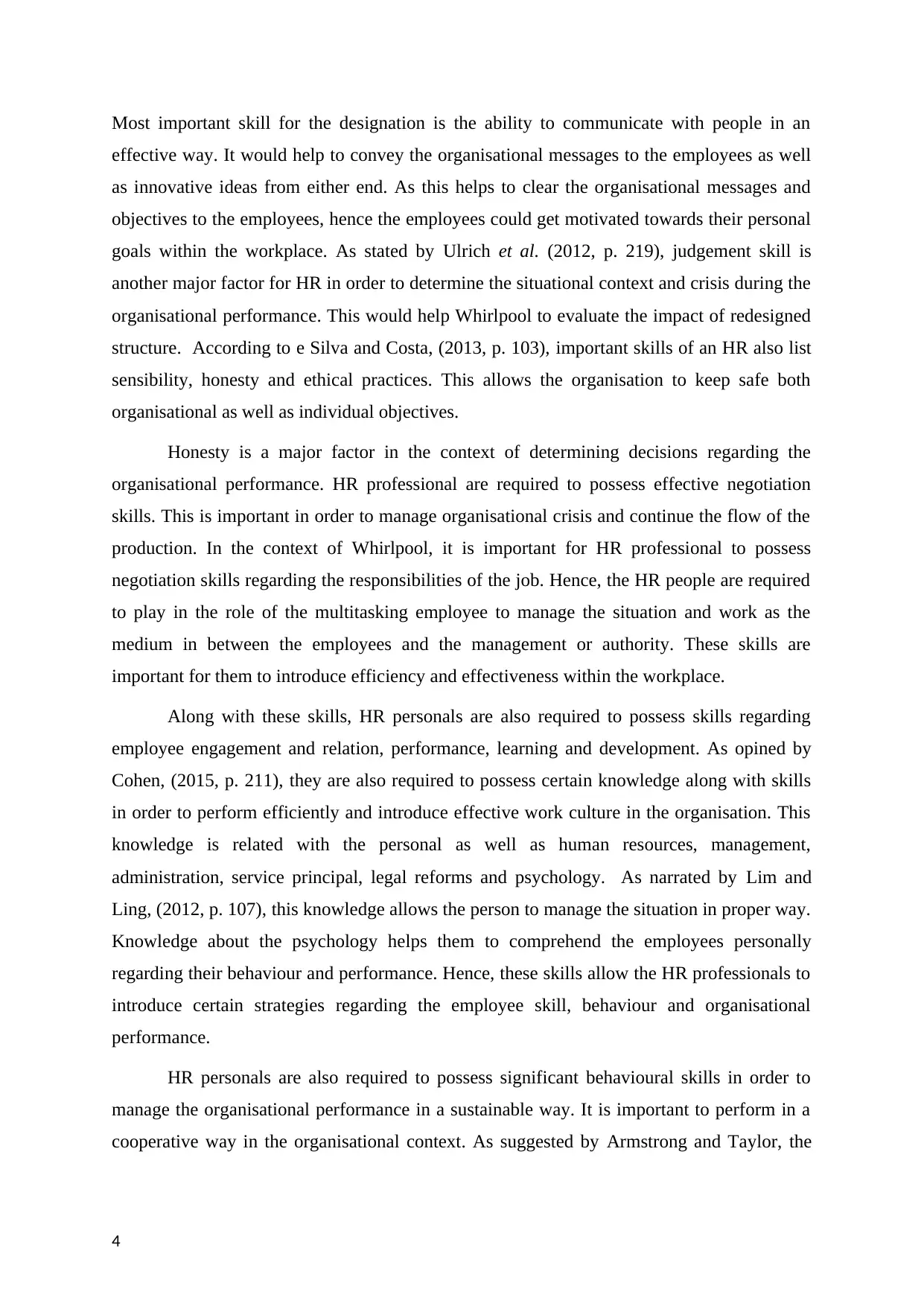
Most important skill for the designation is the ability to communicate with people in an
effective way. It would help to convey the organisational messages to the employees as well
as innovative ideas from either end. As this helps to clear the organisational messages and
objectives to the employees, hence the employees could get motivated towards their personal
goals within the workplace. As stated by Ulrich et al. (2012, p. 219), judgement skill is
another major factor for HR in order to determine the situational context and crisis during the
organisational performance. This would help Whirlpool to evaluate the impact of redesigned
structure. According to e Silva and Costa, (2013, p. 103), important skills of an HR also list
sensibility, honesty and ethical practices. This allows the organisation to keep safe both
organisational as well as individual objectives.
Honesty is a major factor in the context of determining decisions regarding the
organisational performance. HR professional are required to possess effective negotiation
skills. This is important in order to manage organisational crisis and continue the flow of the
production. In the context of Whirlpool, it is important for HR professional to possess
negotiation skills regarding the responsibilities of the job. Hence, the HR people are required
to play in the role of the multitasking employee to manage the situation and work as the
medium in between the employees and the management or authority. These skills are
important for them to introduce efficiency and effectiveness within the workplace.
Along with these skills, HR personals are also required to possess skills regarding
employee engagement and relation, performance, learning and development. As opined by
Cohen, (2015, p. 211), they are also required to possess certain knowledge along with skills
in order to perform efficiently and introduce effective work culture in the organisation. This
knowledge is related with the personal as well as human resources, management,
administration, service principal, legal reforms and psychology. As narrated by Lim and
Ling, (2012, p. 107), this knowledge allows the person to manage the situation in proper way.
Knowledge about the psychology helps them to comprehend the employees personally
regarding their behaviour and performance. Hence, these skills allow the HR professionals to
introduce certain strategies regarding the employee skill, behaviour and organisational
performance.
HR personals are also required to possess significant behavioural skills in order to
manage the organisational performance in a sustainable way. It is important to perform in a
cooperative way in the organisational context. As suggested by Armstrong and Taylor, the
4
effective way. It would help to convey the organisational messages to the employees as well
as innovative ideas from either end. As this helps to clear the organisational messages and
objectives to the employees, hence the employees could get motivated towards their personal
goals within the workplace. As stated by Ulrich et al. (2012, p. 219), judgement skill is
another major factor for HR in order to determine the situational context and crisis during the
organisational performance. This would help Whirlpool to evaluate the impact of redesigned
structure. According to e Silva and Costa, (2013, p. 103), important skills of an HR also list
sensibility, honesty and ethical practices. This allows the organisation to keep safe both
organisational as well as individual objectives.
Honesty is a major factor in the context of determining decisions regarding the
organisational performance. HR professional are required to possess effective negotiation
skills. This is important in order to manage organisational crisis and continue the flow of the
production. In the context of Whirlpool, it is important for HR professional to possess
negotiation skills regarding the responsibilities of the job. Hence, the HR people are required
to play in the role of the multitasking employee to manage the situation and work as the
medium in between the employees and the management or authority. These skills are
important for them to introduce efficiency and effectiveness within the workplace.
Along with these skills, HR personals are also required to possess skills regarding
employee engagement and relation, performance, learning and development. As opined by
Cohen, (2015, p. 211), they are also required to possess certain knowledge along with skills
in order to perform efficiently and introduce effective work culture in the organisation. This
knowledge is related with the personal as well as human resources, management,
administration, service principal, legal reforms and psychology. As narrated by Lim and
Ling, (2012, p. 107), this knowledge allows the person to manage the situation in proper way.
Knowledge about the psychology helps them to comprehend the employees personally
regarding their behaviour and performance. Hence, these skills allow the HR professionals to
introduce certain strategies regarding the employee skill, behaviour and organisational
performance.
HR personals are also required to possess significant behavioural skills in order to
manage the organisational performance in a sustainable way. It is important to perform in a
cooperative way in the organisational context. As suggested by Armstrong and Taylor, the
4
Paraphrase This Document
Need a fresh take? Get an instant paraphrase of this document with our AI Paraphraser
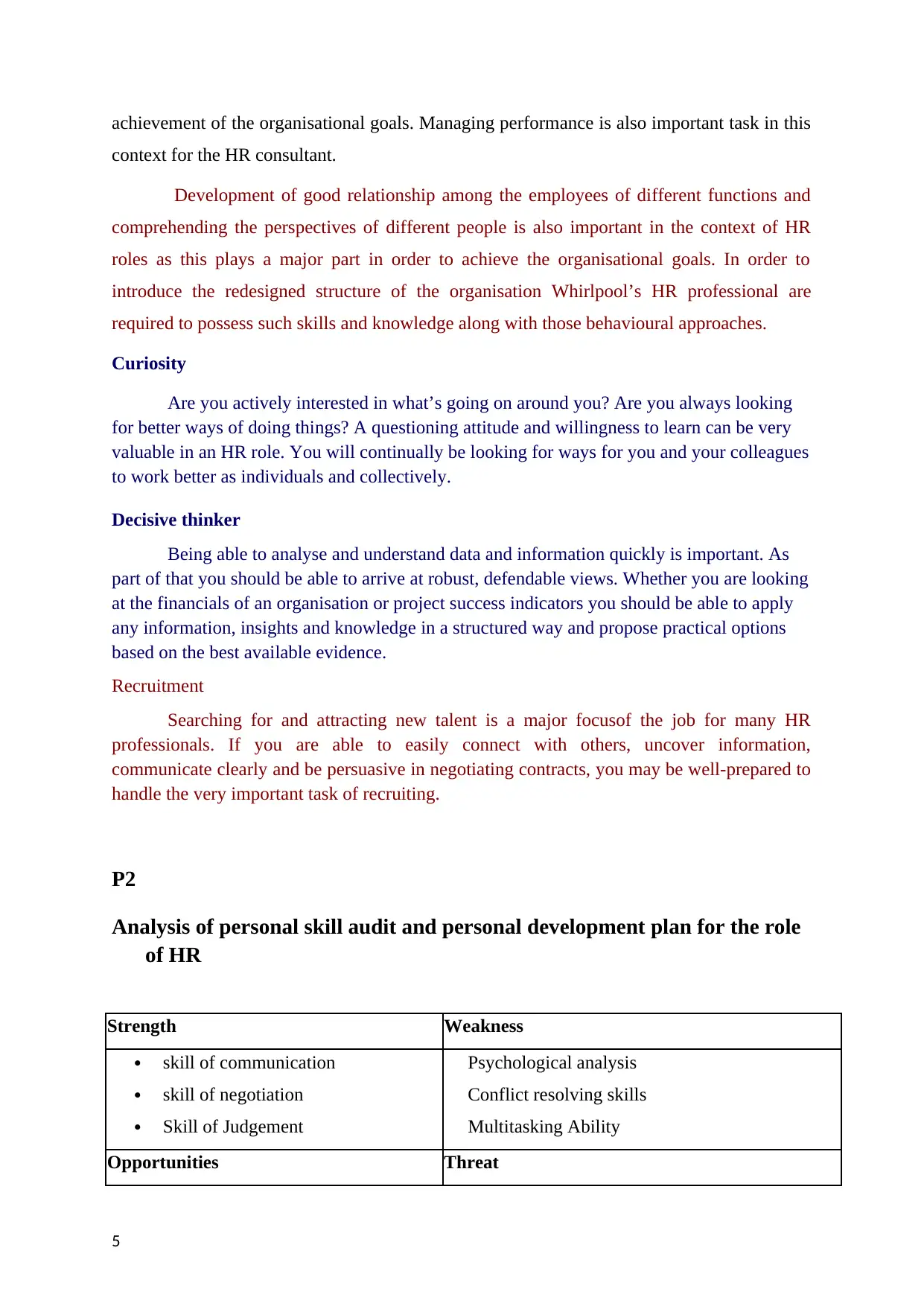
achievement of the organisational goals. Managing performance is also important task in this
context for the HR consultant.
Development of good relationship among the employees of different functions and
comprehending the perspectives of different people is also important in the context of HR
roles as this plays a major part in order to achieve the organisational goals. In order to
introduce the redesigned structure of the organisation Whirlpool’s HR professional are
required to possess such skills and knowledge along with those behavioural approaches.
Curiosity
Are you actively interested in what’s going on around you? Are you always looking
for better ways of doing things? A questioning attitude and willingness to learn can be very
valuable in an HR role. You will continually be looking for ways for you and your colleagues
to work better as individuals and collectively.
Decisive thinker
Being able to analyse and understand data and information quickly is important. As
part of that you should be able to arrive at robust, defendable views. Whether you are looking
at the financials of an organisation or project success indicators you should be able to apply
any information, insights and knowledge in a structured way and propose practical options
based on the best available evidence.
Recruitment
Searching for and attracting new talent is a major focusof the job for many HR
professionals. If you are able to easily connect with others, uncover information,
communicate clearly and be persuasive in negotiating contracts, you may be well-prepared to
handle the very important task of recruiting.
P2
Analysis of personal skill audit and personal development plan for the role
of HR
Strength Weakness
skill of communication
skill of negotiation
Skill of Judgement
Psychological analysis
Conflict resolving skills
Multitasking Ability
Opportunities Threat
5
context for the HR consultant.
Development of good relationship among the employees of different functions and
comprehending the perspectives of different people is also important in the context of HR
roles as this plays a major part in order to achieve the organisational goals. In order to
introduce the redesigned structure of the organisation Whirlpool’s HR professional are
required to possess such skills and knowledge along with those behavioural approaches.
Curiosity
Are you actively interested in what’s going on around you? Are you always looking
for better ways of doing things? A questioning attitude and willingness to learn can be very
valuable in an HR role. You will continually be looking for ways for you and your colleagues
to work better as individuals and collectively.
Decisive thinker
Being able to analyse and understand data and information quickly is important. As
part of that you should be able to arrive at robust, defendable views. Whether you are looking
at the financials of an organisation or project success indicators you should be able to apply
any information, insights and knowledge in a structured way and propose practical options
based on the best available evidence.
Recruitment
Searching for and attracting new talent is a major focusof the job for many HR
professionals. If you are able to easily connect with others, uncover information,
communicate clearly and be persuasive in negotiating contracts, you may be well-prepared to
handle the very important task of recruiting.
P2
Analysis of personal skill audit and personal development plan for the role
of HR
Strength Weakness
skill of communication
skill of negotiation
Skill of Judgement
Psychological analysis
Conflict resolving skills
Multitasking Ability
Opportunities Threat
5
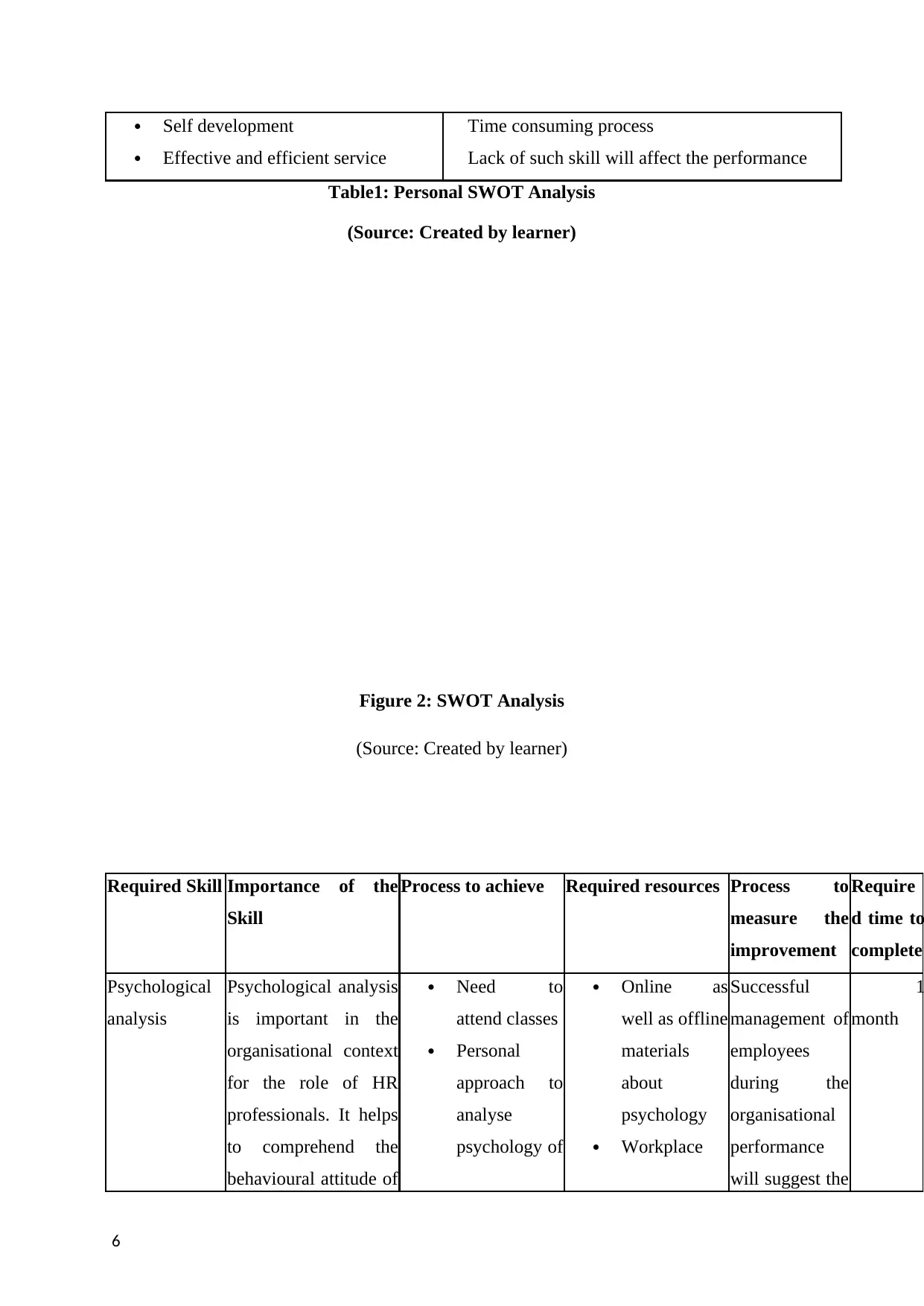
Self development
Effective and efficient service
Time consuming process
Lack of such skill will affect the performance
Table1: Personal SWOT Analysis
(Source: Created by learner)
Figure 2: SWOT Analysis
(Source: Created by learner)
Required Skill Importance of the
Skill
Process to achieve Required resources Process to
measure the
improvement
Require
d time to
complete
Psychological
analysis
Psychological analysis
is important in the
organisational context
for the role of HR
professionals. It helps
to comprehend the
behavioural attitude of
Need to
attend classes
Personal
approach to
analyse
psychology of
Online as
well as offline
materials
about
psychology
Workplace
Successful
management of
employees
during the
organisational
performance
will suggest the
1
month
6
Effective and efficient service
Time consuming process
Lack of such skill will affect the performance
Table1: Personal SWOT Analysis
(Source: Created by learner)
Figure 2: SWOT Analysis
(Source: Created by learner)
Required Skill Importance of the
Skill
Process to achieve Required resources Process to
measure the
improvement
Require
d time to
complete
Psychological
analysis
Psychological analysis
is important in the
organisational context
for the role of HR
professionals. It helps
to comprehend the
behavioural attitude of
Need to
attend classes
Personal
approach to
analyse
psychology of
Online as
well as offline
materials
about
psychology
Workplace
Successful
management of
employees
during the
organisational
performance
will suggest the
1
month
6
⊘ This is a preview!⊘
Do you want full access?
Subscribe today to unlock all pages.

Trusted by 1+ million students worldwide
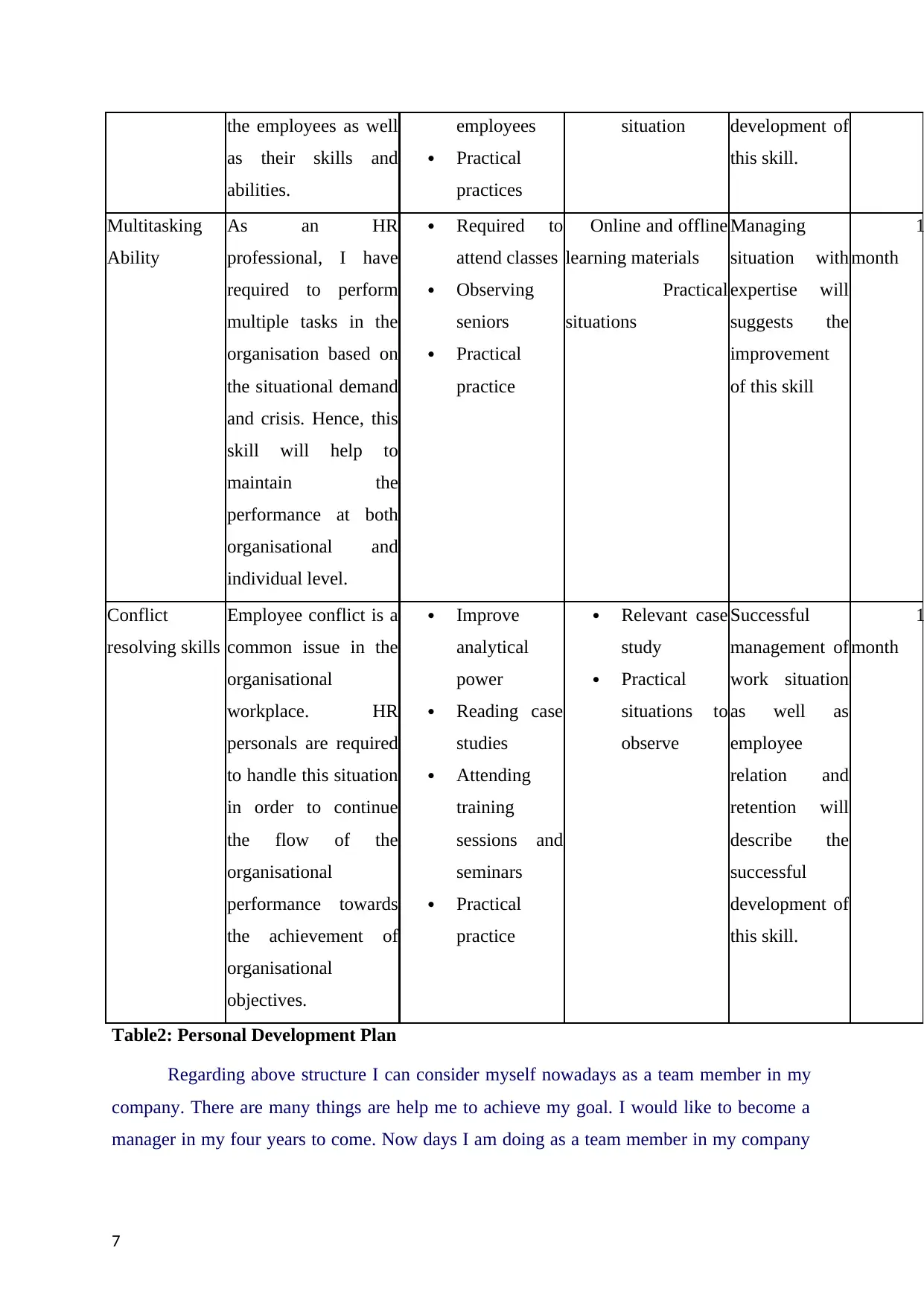
the employees as well
as their skills and
abilities.
employees
Practical
practices
situation development of
this skill.
Multitasking
Ability
As an HR
professional, I have
required to perform
multiple tasks in the
organisation based on
the situational demand
and crisis. Hence, this
skill will help to
maintain the
performance at both
organisational and
individual level.
Required to
attend classes
Observing
seniors
Practical
practice
Online and offline
learning materials
Practical
situations
Managing
situation with
expertise will
suggests the
improvement
of this skill
1
month
Conflict
resolving skills
Employee conflict is a
common issue in the
organisational
workplace. HR
personals are required
to handle this situation
in order to continue
the flow of the
organisational
performance towards
the achievement of
organisational
objectives.
Improve
analytical
power
Reading case
studies
Attending
training
sessions and
seminars
Practical
practice
Relevant case
study
Practical
situations to
observe
Successful
management of
work situation
as well as
employee
relation and
retention will
describe the
successful
development of
this skill.
1
month
Table2: Personal Development Plan
Regarding above structure I can consider myself nowadays as a team member in my
company. There are many things are help me to achieve my goal. I would like to become a
manager in my four years to come. Now days I am doing as a team member in my company
7
as their skills and
abilities.
employees
Practical
practices
situation development of
this skill.
Multitasking
Ability
As an HR
professional, I have
required to perform
multiple tasks in the
organisation based on
the situational demand
and crisis. Hence, this
skill will help to
maintain the
performance at both
organisational and
individual level.
Required to
attend classes
Observing
seniors
Practical
practice
Online and offline
learning materials
Practical
situations
Managing
situation with
expertise will
suggests the
improvement
of this skill
1
month
Conflict
resolving skills
Employee conflict is a
common issue in the
organisational
workplace. HR
personals are required
to handle this situation
in order to continue
the flow of the
organisational
performance towards
the achievement of
organisational
objectives.
Improve
analytical
power
Reading case
studies
Attending
training
sessions and
seminars
Practical
practice
Relevant case
study
Practical
situations to
observe
Successful
management of
work situation
as well as
employee
relation and
retention will
describe the
successful
development of
this skill.
1
month
Table2: Personal Development Plan
Regarding above structure I can consider myself nowadays as a team member in my
company. There are many things are help me to achieve my goal. I would like to become a
manager in my four years to come. Now days I am doing as a team member in my company
7
Paraphrase This Document
Need a fresh take? Get an instant paraphrase of this document with our AI Paraphraser
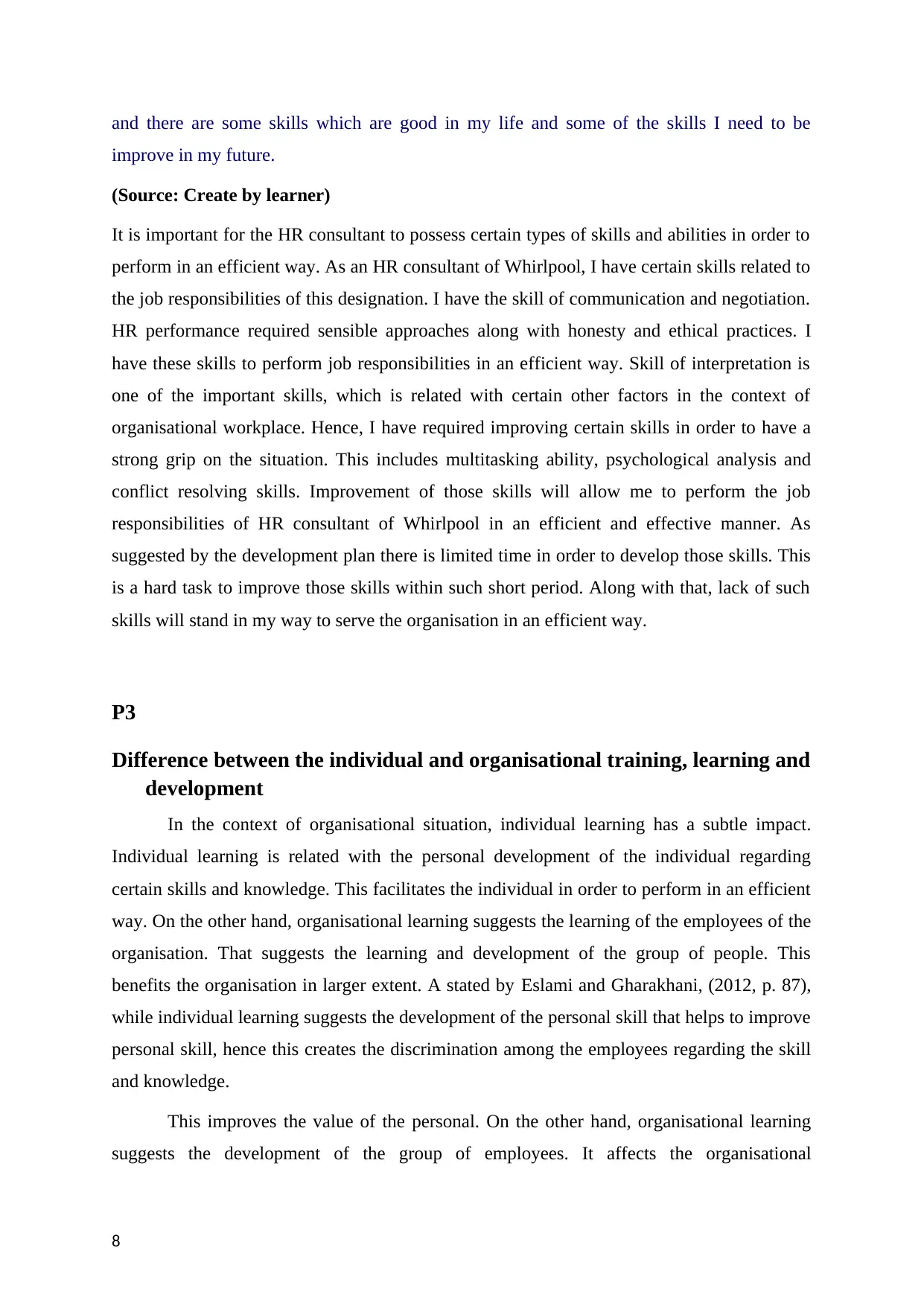
and there are some skills which are good in my life and some of the skills I need to be
improve in my future.
(Source: Create by learner)
It is important for the HR consultant to possess certain types of skills and abilities in order to
perform in an efficient way. As an HR consultant of Whirlpool, I have certain skills related to
the job responsibilities of this designation. I have the skill of communication and negotiation.
HR performance required sensible approaches along with honesty and ethical practices. I
have these skills to perform job responsibilities in an efficient way. Skill of interpretation is
one of the important skills, which is related with certain other factors in the context of
organisational workplace. Hence, I have required improving certain skills in order to have a
strong grip on the situation. This includes multitasking ability, psychological analysis and
conflict resolving skills. Improvement of those skills will allow me to perform the job
responsibilities of HR consultant of Whirlpool in an efficient and effective manner. As
suggested by the development plan there is limited time in order to develop those skills. This
is a hard task to improve those skills within such short period. Along with that, lack of such
skills will stand in my way to serve the organisation in an efficient way.
P3
Difference between the individual and organisational training, learning and
development
In the context of organisational situation, individual learning has a subtle impact.
Individual learning is related with the personal development of the individual regarding
certain skills and knowledge. This facilitates the individual in order to perform in an efficient
way. On the other hand, organisational learning suggests the learning of the employees of the
organisation. That suggests the learning and development of the group of people. This
benefits the organisation in larger extent. A stated by Eslami and Gharakhani, (2012, p. 87),
while individual learning suggests the development of the personal skill that helps to improve
personal skill, hence this creates the discrimination among the employees regarding the skill
and knowledge.
This improves the value of the personal. On the other hand, organisational learning
suggests the development of the group of employees. It affects the organisational
8
improve in my future.
(Source: Create by learner)
It is important for the HR consultant to possess certain types of skills and abilities in order to
perform in an efficient way. As an HR consultant of Whirlpool, I have certain skills related to
the job responsibilities of this designation. I have the skill of communication and negotiation.
HR performance required sensible approaches along with honesty and ethical practices. I
have these skills to perform job responsibilities in an efficient way. Skill of interpretation is
one of the important skills, which is related with certain other factors in the context of
organisational workplace. Hence, I have required improving certain skills in order to have a
strong grip on the situation. This includes multitasking ability, psychological analysis and
conflict resolving skills. Improvement of those skills will allow me to perform the job
responsibilities of HR consultant of Whirlpool in an efficient and effective manner. As
suggested by the development plan there is limited time in order to develop those skills. This
is a hard task to improve those skills within such short period. Along with that, lack of such
skills will stand in my way to serve the organisation in an efficient way.
P3
Difference between the individual and organisational training, learning and
development
In the context of organisational situation, individual learning has a subtle impact.
Individual learning is related with the personal development of the individual regarding
certain skills and knowledge. This facilitates the individual in order to perform in an efficient
way. On the other hand, organisational learning suggests the learning of the employees of the
organisation. That suggests the learning and development of the group of people. This
benefits the organisation in larger extent. A stated by Eslami and Gharakhani, (2012, p. 87),
while individual learning suggests the development of the personal skill that helps to improve
personal skill, hence this creates the discrimination among the employees regarding the skill
and knowledge.
This improves the value of the personal. On the other hand, organisational learning
suggests the development of the group of employees. It affects the organisational
8
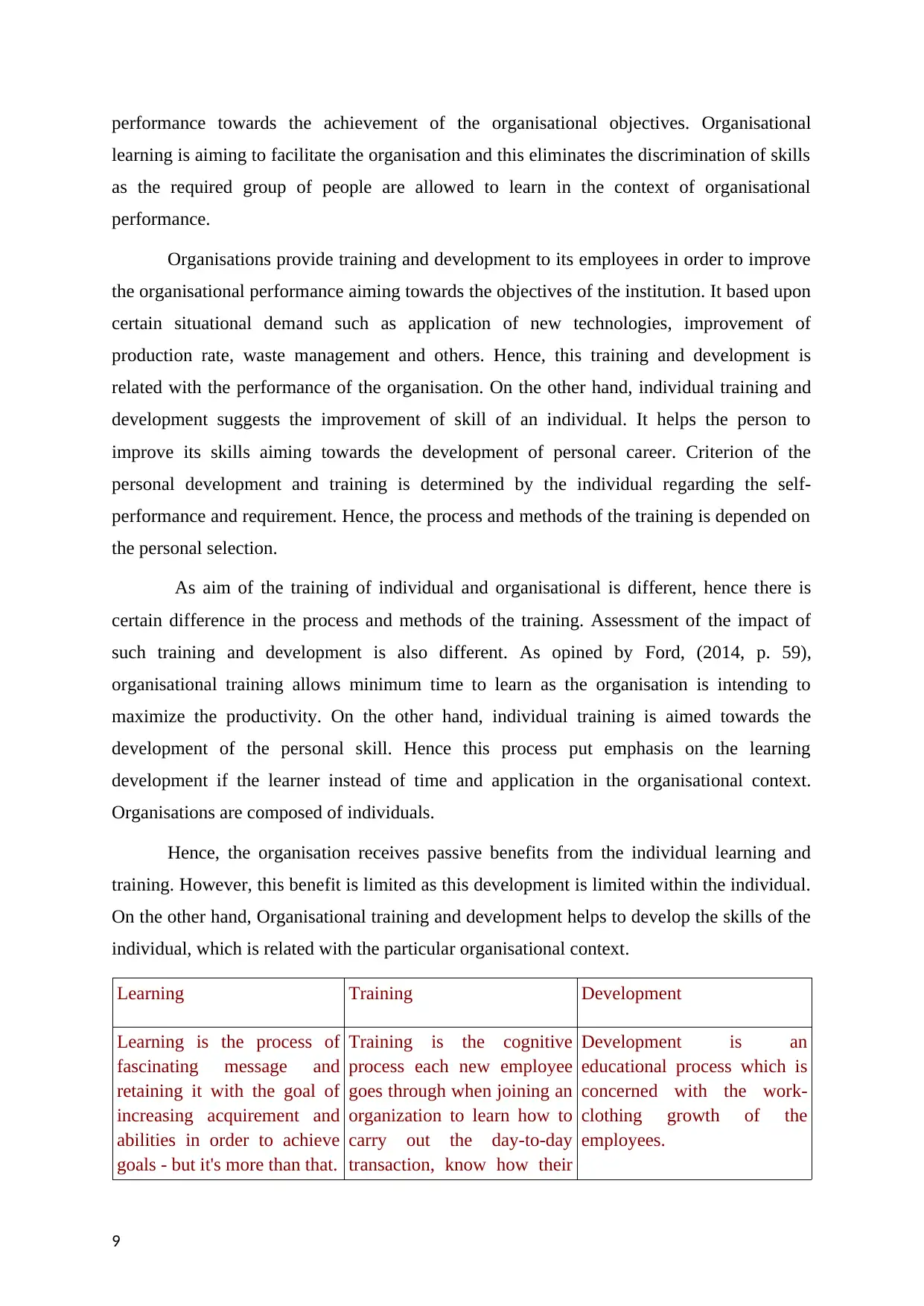
performance towards the achievement of the organisational objectives. Organisational
learning is aiming to facilitate the organisation and this eliminates the discrimination of skills
as the required group of people are allowed to learn in the context of organisational
performance.
Organisations provide training and development to its employees in order to improve
the organisational performance aiming towards the objectives of the institution. It based upon
certain situational demand such as application of new technologies, improvement of
production rate, waste management and others. Hence, this training and development is
related with the performance of the organisation. On the other hand, individual training and
development suggests the improvement of skill of an individual. It helps the person to
improve its skills aiming towards the development of personal career. Criterion of the
personal development and training is determined by the individual regarding the self-
performance and requirement. Hence, the process and methods of the training is depended on
the personal selection.
As aim of the training of individual and organisational is different, hence there is
certain difference in the process and methods of the training. Assessment of the impact of
such training and development is also different. As opined by Ford, (2014, p. 59),
organisational training allows minimum time to learn as the organisation is intending to
maximize the productivity. On the other hand, individual training is aimed towards the
development of the personal skill. Hence this process put emphasis on the learning
development if the learner instead of time and application in the organisational context.
Organisations are composed of individuals.
Hence, the organisation receives passive benefits from the individual learning and
training. However, this benefit is limited as this development is limited within the individual.
On the other hand, Organisational training and development helps to develop the skills of the
individual, which is related with the particular organisational context.
Learning Training Development
Learning is the process of
fascinating message and
retaining it with the goal of
increasing acquirement and
abilities in order to achieve
goals - but it's more than that.
Training is the cognitive
process each new employee
goes through when joining an
organization to learn how to
carry out the day-to-day
transaction, know how their
Development is an
educational process which is
concerned with the work-
clothing growth of the
employees.
9
learning is aiming to facilitate the organisation and this eliminates the discrimination of skills
as the required group of people are allowed to learn in the context of organisational
performance.
Organisations provide training and development to its employees in order to improve
the organisational performance aiming towards the objectives of the institution. It based upon
certain situational demand such as application of new technologies, improvement of
production rate, waste management and others. Hence, this training and development is
related with the performance of the organisation. On the other hand, individual training and
development suggests the improvement of skill of an individual. It helps the person to
improve its skills aiming towards the development of personal career. Criterion of the
personal development and training is determined by the individual regarding the self-
performance and requirement. Hence, the process and methods of the training is depended on
the personal selection.
As aim of the training of individual and organisational is different, hence there is
certain difference in the process and methods of the training. Assessment of the impact of
such training and development is also different. As opined by Ford, (2014, p. 59),
organisational training allows minimum time to learn as the organisation is intending to
maximize the productivity. On the other hand, individual training is aimed towards the
development of the personal skill. Hence this process put emphasis on the learning
development if the learner instead of time and application in the organisational context.
Organisations are composed of individuals.
Hence, the organisation receives passive benefits from the individual learning and
training. However, this benefit is limited as this development is limited within the individual.
On the other hand, Organisational training and development helps to develop the skills of the
individual, which is related with the particular organisational context.
Learning Training Development
Learning is the process of
fascinating message and
retaining it with the goal of
increasing acquirement and
abilities in order to achieve
goals - but it's more than that.
Training is the cognitive
process each new employee
goes through when joining an
organization to learn how to
carry out the day-to-day
transaction, know how their
Development is an
educational process which is
concerned with the work-
clothing growth of the
employees.
9
⊘ This is a preview!⊘
Do you want full access?
Subscribe today to unlock all pages.

Trusted by 1+ million students worldwide
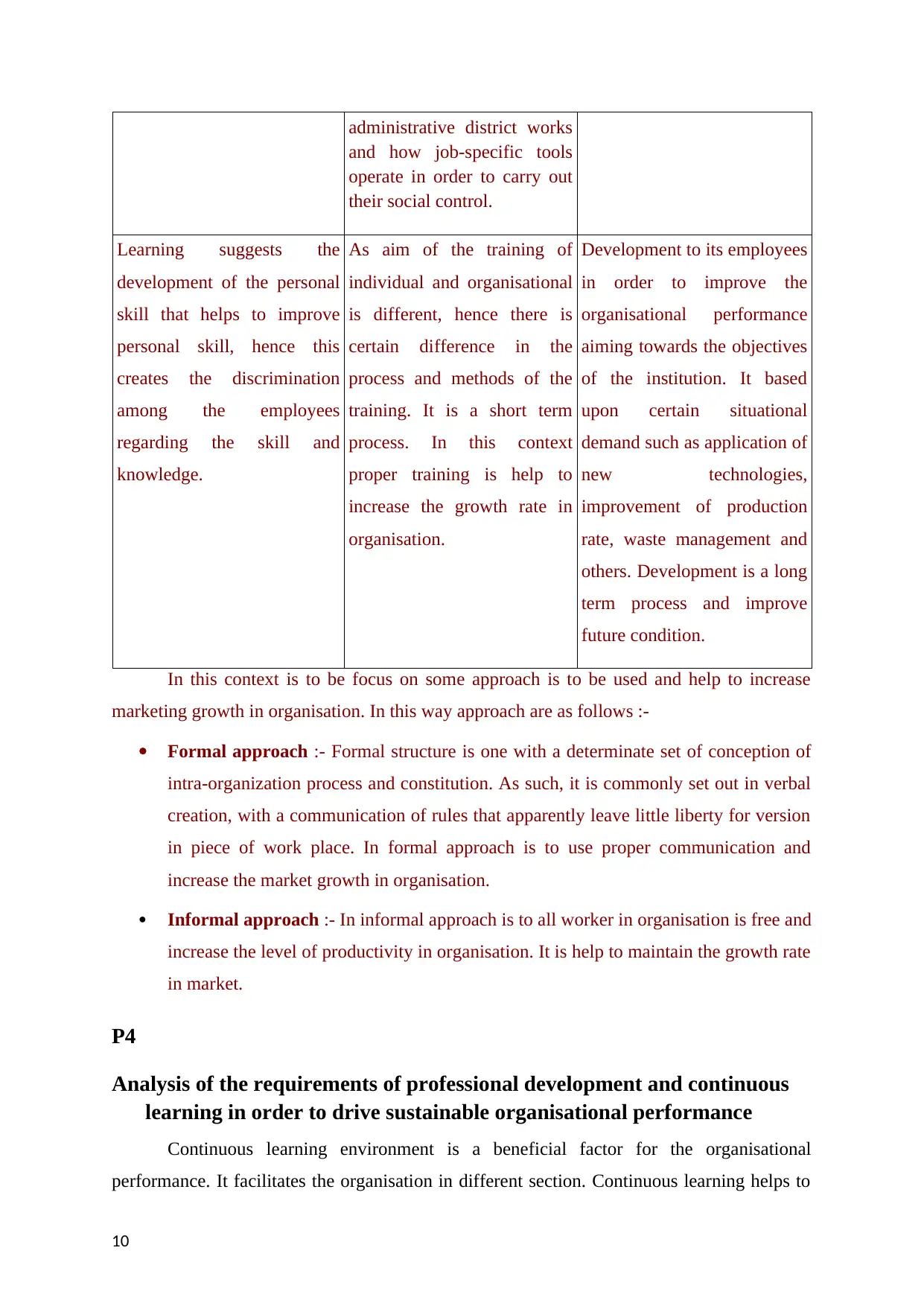
administrative district works
and how job-specific tools
operate in order to carry out
their social control.
Learning suggests the
development of the personal
skill that helps to improve
personal skill, hence this
creates the discrimination
among the employees
regarding the skill and
knowledge.
As aim of the training of
individual and organisational
is different, hence there is
certain difference in the
process and methods of the
training. It is a short term
process. In this context
proper training is help to
increase the growth rate in
organisation.
Development to its employees
in order to improve the
organisational performance
aiming towards the objectives
of the institution. It based
upon certain situational
demand such as application of
new technologies,
improvement of production
rate, waste management and
others. Development is a long
term process and improve
future condition.
In this context is to be focus on some approach is to be used and help to increase
marketing growth in organisation. In this way approach are as follows :-
Formal approach :- Formal structure is one with a determinate set of conception of
intra-organization process and constitution. As such, it is commonly set out in verbal
creation, with a communication of rules that apparently leave little liberty for version
in piece of work place. In formal approach is to use proper communication and
increase the market growth in organisation.
Informal approach :- In informal approach is to all worker in organisation is free and
increase the level of productivity in organisation. It is help to maintain the growth rate
in market.
P4
Analysis of the requirements of professional development and continuous
learning in order to drive sustainable organisational performance
Continuous learning environment is a beneficial factor for the organisational
performance. It facilitates the organisation in different section. Continuous learning helps to
10
and how job-specific tools
operate in order to carry out
their social control.
Learning suggests the
development of the personal
skill that helps to improve
personal skill, hence this
creates the discrimination
among the employees
regarding the skill and
knowledge.
As aim of the training of
individual and organisational
is different, hence there is
certain difference in the
process and methods of the
training. It is a short term
process. In this context
proper training is help to
increase the growth rate in
organisation.
Development to its employees
in order to improve the
organisational performance
aiming towards the objectives
of the institution. It based
upon certain situational
demand such as application of
new technologies,
improvement of production
rate, waste management and
others. Development is a long
term process and improve
future condition.
In this context is to be focus on some approach is to be used and help to increase
marketing growth in organisation. In this way approach are as follows :-
Formal approach :- Formal structure is one with a determinate set of conception of
intra-organization process and constitution. As such, it is commonly set out in verbal
creation, with a communication of rules that apparently leave little liberty for version
in piece of work place. In formal approach is to use proper communication and
increase the market growth in organisation.
Informal approach :- In informal approach is to all worker in organisation is free and
increase the level of productivity in organisation. It is help to maintain the growth rate
in market.
P4
Analysis of the requirements of professional development and continuous
learning in order to drive sustainable organisational performance
Continuous learning environment is a beneficial factor for the organisational
performance. It facilitates the organisation in different section. Continuous learning helps to
10
Paraphrase This Document
Need a fresh take? Get an instant paraphrase of this document with our AI Paraphraser
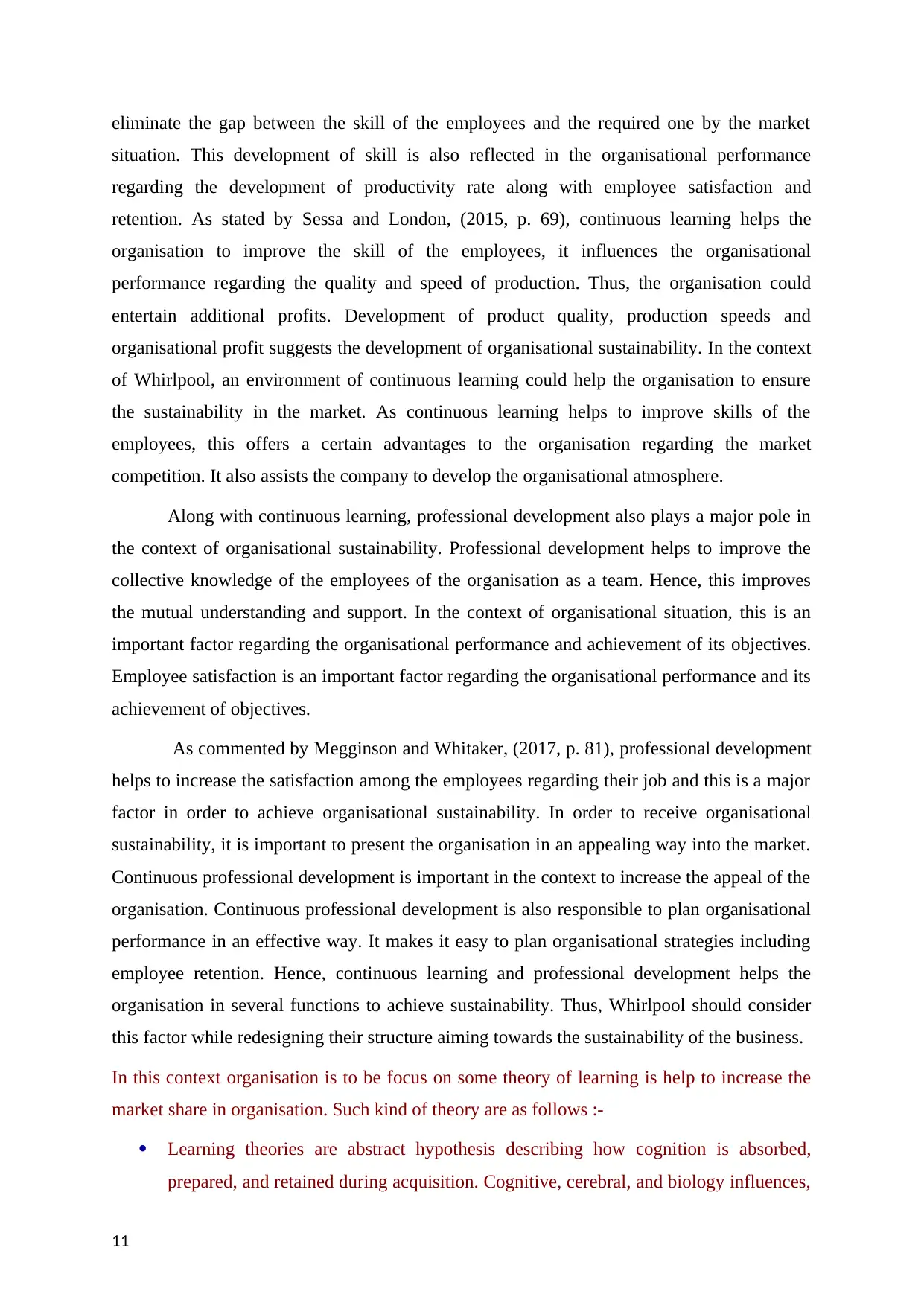
eliminate the gap between the skill of the employees and the required one by the market
situation. This development of skill is also reflected in the organisational performance
regarding the development of productivity rate along with employee satisfaction and
retention. As stated by Sessa and London, (2015, p. 69), continuous learning helps the
organisation to improve the skill of the employees, it influences the organisational
performance regarding the quality and speed of production. Thus, the organisation could
entertain additional profits. Development of product quality, production speeds and
organisational profit suggests the development of organisational sustainability. In the context
of Whirlpool, an environment of continuous learning could help the organisation to ensure
the sustainability in the market. As continuous learning helps to improve skills of the
employees, this offers a certain advantages to the organisation regarding the market
competition. It also assists the company to develop the organisational atmosphere.
Along with continuous learning, professional development also plays a major pole in
the context of organisational sustainability. Professional development helps to improve the
collective knowledge of the employees of the organisation as a team. Hence, this improves
the mutual understanding and support. In the context of organisational situation, this is an
important factor regarding the organisational performance and achievement of its objectives.
Employee satisfaction is an important factor regarding the organisational performance and its
achievement of objectives.
As commented by Megginson and Whitaker, (2017, p. 81), professional development
helps to increase the satisfaction among the employees regarding their job and this is a major
factor in order to achieve organisational sustainability. In order to receive organisational
sustainability, it is important to present the organisation in an appealing way into the market.
Continuous professional development is important in the context to increase the appeal of the
organisation. Continuous professional development is also responsible to plan organisational
performance in an effective way. It makes it easy to plan organisational strategies including
employee retention. Hence, continuous learning and professional development helps the
organisation in several functions to achieve sustainability. Thus, Whirlpool should consider
this factor while redesigning their structure aiming towards the sustainability of the business.
In this context organisation is to be focus on some theory of learning is help to increase the
market share in organisation. Such kind of theory are as follows :-
Learning theories are abstract hypothesis describing how cognition is absorbed,
prepared, and retained during acquisition. Cognitive, cerebral, and biology influences,
11
situation. This development of skill is also reflected in the organisational performance
regarding the development of productivity rate along with employee satisfaction and
retention. As stated by Sessa and London, (2015, p. 69), continuous learning helps the
organisation to improve the skill of the employees, it influences the organisational
performance regarding the quality and speed of production. Thus, the organisation could
entertain additional profits. Development of product quality, production speeds and
organisational profit suggests the development of organisational sustainability. In the context
of Whirlpool, an environment of continuous learning could help the organisation to ensure
the sustainability in the market. As continuous learning helps to improve skills of the
employees, this offers a certain advantages to the organisation regarding the market
competition. It also assists the company to develop the organisational atmosphere.
Along with continuous learning, professional development also plays a major pole in
the context of organisational sustainability. Professional development helps to improve the
collective knowledge of the employees of the organisation as a team. Hence, this improves
the mutual understanding and support. In the context of organisational situation, this is an
important factor regarding the organisational performance and achievement of its objectives.
Employee satisfaction is an important factor regarding the organisational performance and its
achievement of objectives.
As commented by Megginson and Whitaker, (2017, p. 81), professional development
helps to increase the satisfaction among the employees regarding their job and this is a major
factor in order to achieve organisational sustainability. In order to receive organisational
sustainability, it is important to present the organisation in an appealing way into the market.
Continuous professional development is important in the context to increase the appeal of the
organisation. Continuous professional development is also responsible to plan organisational
performance in an effective way. It makes it easy to plan organisational strategies including
employee retention. Hence, continuous learning and professional development helps the
organisation in several functions to achieve sustainability. Thus, Whirlpool should consider
this factor while redesigning their structure aiming towards the sustainability of the business.
In this context organisation is to be focus on some theory of learning is help to increase the
market share in organisation. Such kind of theory are as follows :-
Learning theories are abstract hypothesis describing how cognition is absorbed,
prepared, and retained during acquisition. Cognitive, cerebral, and biology influences,
11
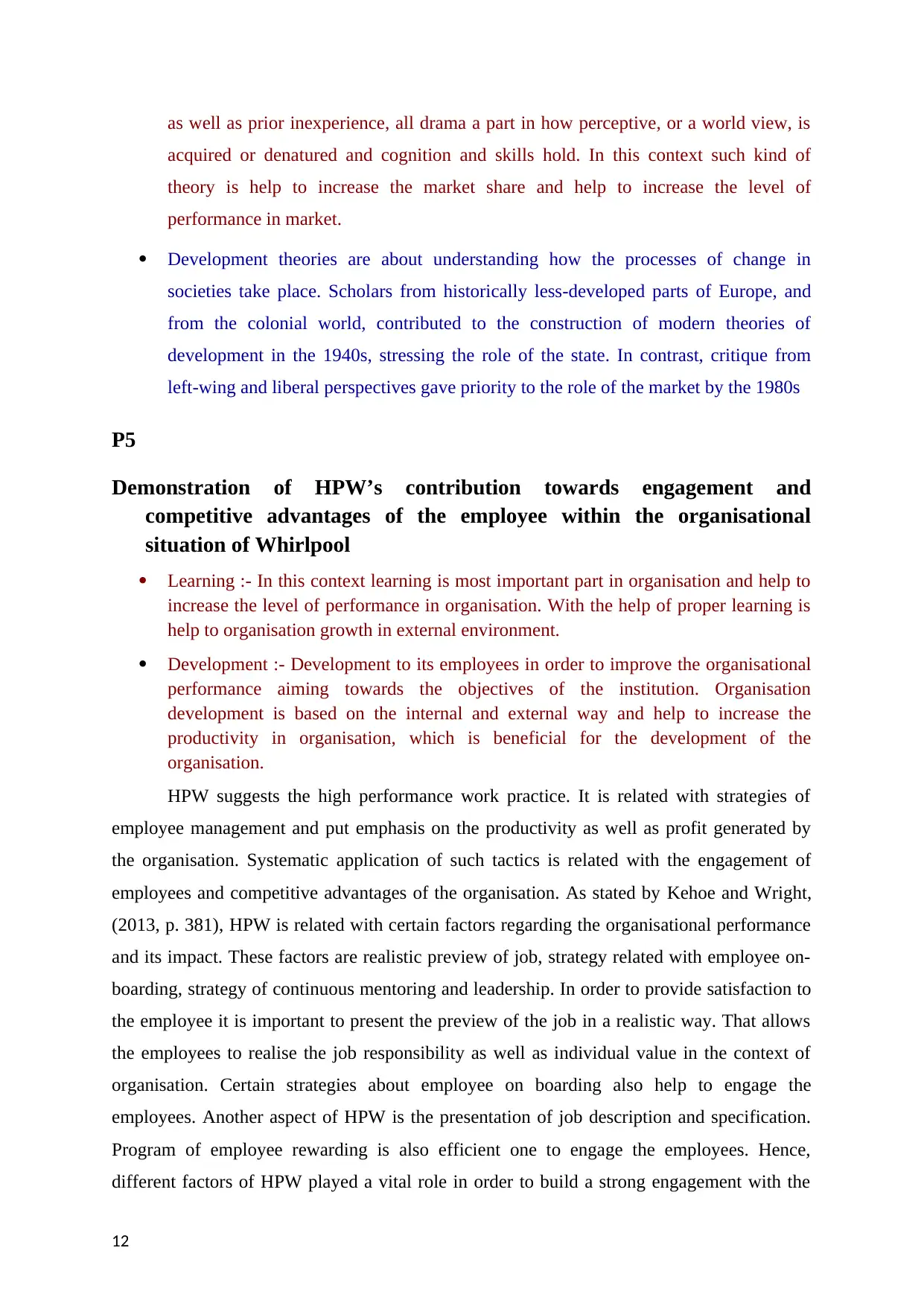
as well as prior inexperience, all drama a part in how perceptive, or a world view, is
acquired or denatured and cognition and skills hold. In this context such kind of
theory is help to increase the market share and help to increase the level of
performance in market.
Development theories are about understanding how the processes of change in
societies take place. Scholars from historically less-developed parts of Europe, and
from the colonial world, contributed to the construction of modern theories of
development in the 1940s, stressing the role of the state. In contrast, critique from
left-wing and liberal perspectives gave priority to the role of the market by the 1980s
P5
Demonstration of HPW’s contribution towards engagement and
competitive advantages of the employee within the organisational
situation of Whirlpool
Learning :- In this context learning is most important part in organisation and help to
increase the level of performance in organisation. With the help of proper learning is
help to organisation growth in external environment.
Development :- Development to its employees in order to improve the organisational
performance aiming towards the objectives of the institution. Organisation
development is based on the internal and external way and help to increase the
productivity in organisation, which is beneficial for the development of the
organisation.
HPW suggests the high performance work practice. It is related with strategies of
employee management and put emphasis on the productivity as well as profit generated by
the organisation. Systematic application of such tactics is related with the engagement of
employees and competitive advantages of the organisation. As stated by Kehoe and Wright,
(2013, p. 381), HPW is related with certain factors regarding the organisational performance
and its impact. These factors are realistic preview of job, strategy related with employee on-
boarding, strategy of continuous mentoring and leadership. In order to provide satisfaction to
the employee it is important to present the preview of the job in a realistic way. That allows
the employees to realise the job responsibility as well as individual value in the context of
organisation. Certain strategies about employee on boarding also help to engage the
employees. Another aspect of HPW is the presentation of job description and specification.
Program of employee rewarding is also efficient one to engage the employees. Hence,
different factors of HPW played a vital role in order to build a strong engagement with the
12
acquired or denatured and cognition and skills hold. In this context such kind of
theory is help to increase the market share and help to increase the level of
performance in market.
Development theories are about understanding how the processes of change in
societies take place. Scholars from historically less-developed parts of Europe, and
from the colonial world, contributed to the construction of modern theories of
development in the 1940s, stressing the role of the state. In contrast, critique from
left-wing and liberal perspectives gave priority to the role of the market by the 1980s
P5
Demonstration of HPW’s contribution towards engagement and
competitive advantages of the employee within the organisational
situation of Whirlpool
Learning :- In this context learning is most important part in organisation and help to
increase the level of performance in organisation. With the help of proper learning is
help to organisation growth in external environment.
Development :- Development to its employees in order to improve the organisational
performance aiming towards the objectives of the institution. Organisation
development is based on the internal and external way and help to increase the
productivity in organisation, which is beneficial for the development of the
organisation.
HPW suggests the high performance work practice. It is related with strategies of
employee management and put emphasis on the productivity as well as profit generated by
the organisation. Systematic application of such tactics is related with the engagement of
employees and competitive advantages of the organisation. As stated by Kehoe and Wright,
(2013, p. 381), HPW is related with certain factors regarding the organisational performance
and its impact. These factors are realistic preview of job, strategy related with employee on-
boarding, strategy of continuous mentoring and leadership. In order to provide satisfaction to
the employee it is important to present the preview of the job in a realistic way. That allows
the employees to realise the job responsibility as well as individual value in the context of
organisation. Certain strategies about employee on boarding also help to engage the
employees. Another aspect of HPW is the presentation of job description and specification.
Program of employee rewarding is also efficient one to engage the employees. Hence,
different factors of HPW played a vital role in order to build a strong engagement with the
12
⊘ This is a preview!⊘
Do you want full access?
Subscribe today to unlock all pages.

Trusted by 1+ million students worldwide
1 out of 17
Related Documents
Your All-in-One AI-Powered Toolkit for Academic Success.
+13062052269
info@desklib.com
Available 24*7 on WhatsApp / Email
![[object Object]](/_next/static/media/star-bottom.7253800d.svg)
Unlock your academic potential
Copyright © 2020–2026 A2Z Services. All Rights Reserved. Developed and managed by ZUCOL.





